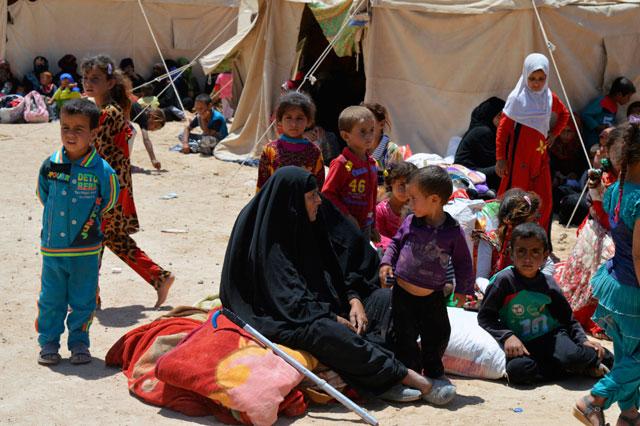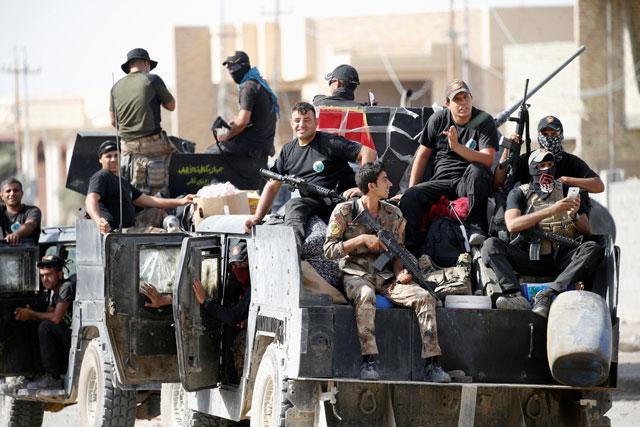You are here
Iraqi forces push in Fallujah amid concern over civilians
By AFP - Jun 16,2016 - Last updated at Jun 16,2016
FALLUJAH, Iraq — Iraqi elite forces battled Daesh militatnts Thursday in their bastion of Fallujah, where an aid group says nearly four weeks of fighting have ensnared civilians in a humanitarian disaster.
Forces from the counterterrorism service (CTS) pushed into the Nazzal neighbourhood, consolidating their grip on the southern part of the city and working their way up to the centre.
"Our troops are operating in Nazzal, where just today we were able to destroy 15 car bombs driven by Daesh terrorists," Raed Shaker Jawdat, Iraq's federal police chief, told AFP.
Iraqi forces launched an operation to retake Fallujah, which lies only 50 kilometres west of Baghdad, last month.
The advance of pro-government forces has since been slow, with Fallujah's status as an emblematic Daesh stronghold and a tight siege by Iraqi forces ensuring holdout militants have few options other than fighting to the death.
In the southern neighbourhoods, once densely populated and now completely empty of civilians, every home bore the pockmarks of the battle.
CTS units parked their Humvees on the sandy streets and organised the logistics of new positions they were setting up inside the city.
"With this heat, this dust and all the things we have to wear, sitting in the Humvees all the time, I just couldn't fast," said a fighter who gave his name as Ali, as he offloaded huge pots of beans and crates of fruit from a pickup truck.
The holy month of Ramadan started nearly two weeks ago but very few among the government forces on the Fallujah battlefield went without at least water.
“Our advance is excellent so morale is high. We don’t care what Daesh throws at us, we know we will win this battle,” said Jamal Abdullah, a federal police captain.
Besides the crackle of sniper fire, the whizz of rockets and the occasional thunderous air strike, the days are paced by controlled explosions of the thousands of bombs Daesh laid across the city.
What has also slowed the advance of Iraqi troops is the presence of thousands of civilians in the city centre, most of them now concentrated in the northern neighbourhoods still firmly controlled by the terrorists.
They are facing the double danger of being used by Daesh as human shields and, in the case of young men in particular, of being detained by government forces on suspicion of collaborating with the militants.
Fallujah and the areas around it are Sunni Muslim while the paramilitary forces fighting alongside the government are dominated by Shiite militias, some of which are supported by Tehran.
Their involvement in the operation had raised fears the battle would see collective revenge against Sunni civilians and allegations of torture have mounted in recent days.
Prime Minister Haider Al Abadi has vowed to investigate allegations of abuse.
For the families filling the displacement camps set up around Fallujah, basic supplies were also getting dangerously low, the Norwegian Refugee Council (NRC) warned Thursday.
“Thousands fleeing the cross-fire after months of besiegement and near starvation deserve relief and care, but our relief supplies will soon be exhausted,” NRC chief Jan Egeland said.
“Those who flee Daesh-controlled areas and manage to make it to safety will soon find out there is very little we can offer them: we are running out of food, drinking water and medical services,” the NRC said.
The aid group said it can only offer survivors three litres of water a day — well under the 10 litres needed in temperatures nearing 50°C.
According to the International Organisation of Migration, at least 48,000 people have managed to escape since the offensive was launched more than three weeks ago.
Related Articles
BAGHDAD — Civilians who managed to flee besieged Fallujah have reported cases of starvation in the Iraqi city that government forces are try
BAGHDAD — Iraqi forces thrust into Fallujah Monday, ushering a new urban phase in the week-old operation to retake the extremists bastion th
FALLUJAH, Iraq — Iraqi forces took the Daesh terror group’s last position in the city of Fallujah Sunday, establishing full control over one

















